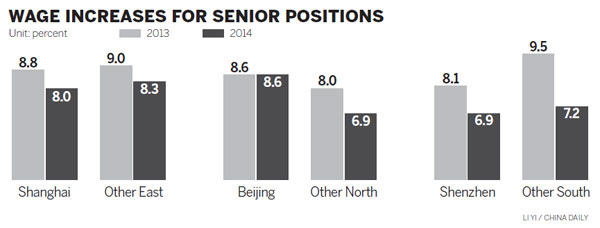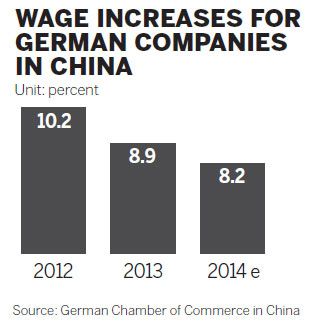Wage rises 'likely to moderate' in 2014
Updated: 2013-10-15 07:37
By Li Jiabao (China Daily)
|
||||||||

Annual wage increases in German companies operating in China are likely to decrease in 2014 due to the slower economic growth, as rising labor costs remain the major human resources issue, a report from the German Chamber of Commerce in China has said.
Overall wages are expected to increase 8.2 percent in 2014, compared with the 8.9-percent growth in 2013 and the 10.2-percent growth in 2012, according to the Wage and Salary Survey of 2013, which was released on Monday.

The survey was conducted between Aug 19 and Sept 17, with the participation of 287 companies, mainly in industries such as machinery, vehicles, electronics, and consulting.
"As GDP growth cools, wage growth is expected to stabilize at lower levels," said Max Zenglein, an economic analyst for greater China at the chamber. "Nearly all job positions will see decreasing wage growth, with limited regional variation. And individual and company performance are most important for determining new wage levels."
China's GDP growth is expected to stay at more moderate levels of about 7.5 percent in the near future, while the country's working population, which increased less than 1 percent in 2012, will likely continue to see little growth, Zenglein said.
"Despite the economic slowdown, the labor market is likely to remain tight due to the major factors of skills mismatch, aging population, and slowdown of migrant population. But more than 60 percent of surveyed German companies plan to expand their workforce," he added.
Wage growth at foreign-owned companies has outpaced the productivity gains in industrial sectors, as well in the service sector, since 2011, according to the survey.
Blue-collar workers, rather than junior, mid-level or senior white-collar employees, will see the highest wage increases in 2014, of 9.1 percent across the country, while more senior positions will see the lowest growth rates, at 7.9 percent nationally, the largest overall growth reduction, according to the survey.
Most Viewed
Editor's Picks

|

|

|

|

|

|
Today's Top News
Chinese may have discovered the future of batteries
UK 'open' to Chinese nuclear investment
All 86 tourists evacuated from Mount Qomolangma
Obama hopeful as meeting nears with lawmakers
Canton Fair to promote yuan use
Over 380 detained in Moscow riot
86 trapped at Mount Qomolangma camp amid snow
Going green can make good money sense
US Weekly

|

|















